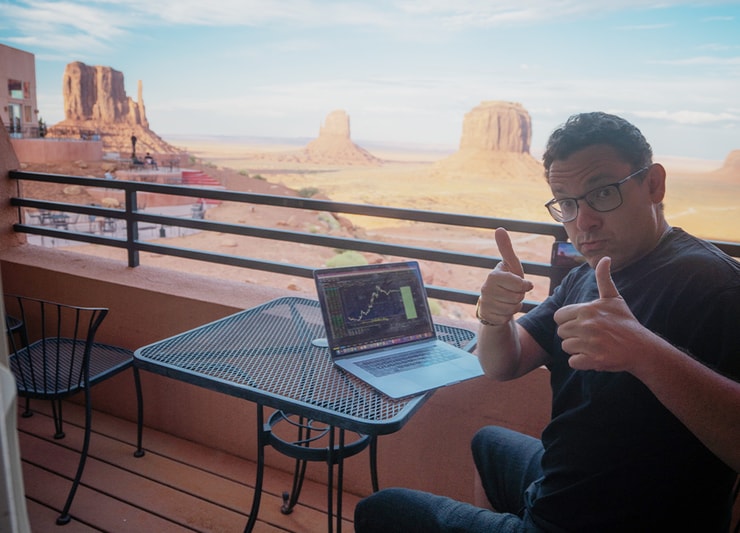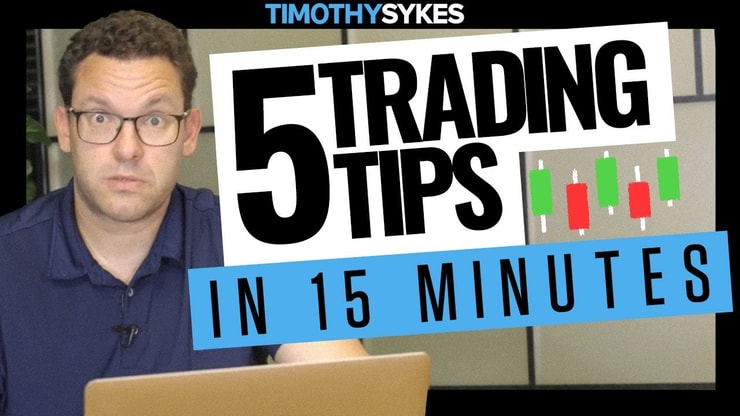Day trading isn’t just a job; it’s a lifestyle that requires both financial and mental commitment. For many aspiring traders, the most pressing question is about the initial capital required to start day trading for a living. This article, drawing from years of trading experience, aims to answer that question comprehensively.
Read this article to gain a comprehensive understanding of the financial and strategic requirements for day trading success, because it delves into the essential aspects of capital, risk management, and market dynamics.
I’ll answer the following questions:
- What is day trading?
- How does day trading work?
- What are the advantages of day trading?
- How much money do you need to day trade for a living?
- What are the key preparations needed for successful day trading?
- How do you choose the right brokerage firm and platform for day trading?
- What are some effective tips for successful day trading?
- What is the success rate among day traders?
Let’s get to the content!
Table of Contents
- 1 What Is Day Trading?
- 2 Advantages of Day Trading
- 3 What Day Traders Do
- 4 How Much Money Do You Need to Day Trade for a Living?
- 5 How Much Money Do You Need to Day Trade Stocks?
- 6 How Much Money Do You Need to Day Trade Forex?
- 7 How Much Money Do You Need to Day Trade Futures?
- 8 How Much Money Do You Need to Meet Your Goals?
- 9 How Much To Day Trade: Preparations
- 10 Getting Started with Day Trading
- 11 Tips for Successful Day Trading
- 12 Key Takeaways
- 13 Frequently Asked Questions
- 13.1 How Many Trades Can a Day Trader Make in a Day?
- 13.2 What is the Success Rate Among Day Traders?
- 13.3 What are the Financial Risks of Day Trading?
- 13.4 What Are Some Key Things to Know Before Day Trading?
- 13.5 Can You Share Examples of Successful Day Trading Strategies?
- 13.6 How Much Knowledge Is Needed to Day Trade Effectively?
- 13.7 How Important Are Market Movements in Day Trading?
- 13.8 Can Day Trading Help in Planning for Retirement?
What Is Day Trading?

2025 Millionaire Media, LLCDay trading involves buying and selling financial instruments within the same trading day. Traders capitalize on short-term market volatility to earn profits, closing out all positions by the market’s close to avoid overnight risk. This style of trading demands constant attention to market movements, a thorough understanding of stocks, options, or forex, and the ability to make quick decisions.
How Does Day Trading Work?
The essence of day trading lies in exploiting short-term market fluctuations. Unlike traditional investors, day traders focus on intraday price movements and trends, using leverage to amplify their trading capital. A typical day might involve numerous trades, requiring a deep understanding of market dynamics and a solid risk management strategy. Success in day trading also depends on the trader’s ability to adapt to rapidly changing market conditions.
Advantages of Day Trading
Day trading offers unique benefits. It presents the potential for high profits due to the leverage and volatility involved. Unlike holding positions overnight or longer, day trading eliminates the risk of significant market movements occurring outside of trading hours. This independence allows traders to operate on their own terms, choosing strategies that best suit their style. With a variety of strategies available, from trend following to scalping, day traders can exploit different market inefficiencies. Instant results are another perk, as day traders see the outcome of their strategies the same day, adjusting as needed. Additionally, the barriers to entry are relatively low, with access to a myriad of online brokers and platforms.
Potential for High Profits
Day trading can be highly profitable, especially for those who master the art of leveraging short-term market movements. The use of leverage allows traders to magnify their trading capital, potentially leading to significant profits from relatively small price changes in the market.
More Breaking News
- VEON’s Digital Leap: A New Era
- Thomson Reuters Benefits from Strategic Moves and Positive Market Sentiment
- PFGC Stock Surge: What’s Driving It?
No Overnight Risk
One of the appealing aspects of day trading is the absence of overnight risk. Since positions are not held beyond the trading day, traders are not exposed to potential market changes that can occur when the market is closed, such as overnight news events or economic updates.
Independence
Day trading offers a level of independence not typically found in other jobs. Traders have the freedom to set their own schedules, choose their trading strategies, and make decisions based on their analysis and instincts.
Variety of Strategies
The diversity of strategies available to day traders is vast, ranging from technical analysis and chart reading to more complex algorithmic trading. This variety allows traders to find a niche that suits their style and strengths.
Instant Results
The immediacy of day trading is a major draw. Unlike long-term investments, day trading provides immediate feedback on trading strategies and decisions, allowing for quick adjustments and learning.
Ease of Entry
Getting started in day trading is relatively straightforward, with a plethora of educational resources, trading platforms, and brokers available online. This ease of entry makes it an accessible option for many aspiring traders.
Exploiting Market Inefficiencies
Day traders aim to capitalize on market inefficiencies, such as temporary mispricings or delayed reactions to news, to make profits. This requires a keen eye for detail and a thorough understanding of market dynamics.
What Day Traders Do
Day traders engage in a high level of market analysis and execution of trades. They spend their days monitoring price movements, news, and technical indicators, constantly looking for profitable entry and exit points. This process requires a balance between comprehensive market research and the psychological discipline to make timely decisions.
How Much Money Do You Need to Day Trade for a Living?

2025 Millionaire Media, LLCDetermining the right amount of money to start day trading for a living varies for each individual. Factors like risk tolerance, living expenses, and the chosen market (stocks, forex, futures) play a crucial role. In the U.S., the Financial Industry Regulatory Authority (FINRA) requires a minimum of $25,000 in a margin account for pattern day trading.
However, this is just a regulatory baseline. If you keep your day trades under 3 per week, you can start with any amount. Cash accounts don’t need to deal with these types of restrictions — however, they have to deal with others, like waiting for their trades to settle before using the proceeds.
These options come with their own set of rules and risks, so it’s important to be well-informed. For those looking to start day trading with less capital, check out my insights on how to day trade without $25k.
How Much Money Do You Need to Day Trade Stocks?
See above. And then check out the video below:
How Much Money Do You Need to Day Trade Forex?
Forex, or foreign exchange, trading often requires less capital to start compared to stocks. This is due to higher leverage available in forex markets. Traders can start with a smaller amount, such as $500 or $1,000, but should be aware of the risks high leverage brings. Efficient risk management is crucial in forex trading to protect against rapid currency fluctuations.
How Much Money Do You Need to Day Trade Futures?
Futures trading involves buying and selling contracts for future delivery of assets like commodities or indices. It typically requires a higher capital base than forex due to the size and volatility of futures contracts. Traders should start with a significant amount of capital, often higher than the minimum margin requirements, to effectively manage risks and absorb potential losses.
How Much Money Do You Need to Meet Your Goals?
The amount of money you need to day trade effectively is also tied to your financial goals. If day trading is to be a primary source of income, you need to consider your living expenses, desired salary, and the ability to sustain losses. Setting realistic income goals and having a sufficient capital base to reach these goals without excessive risk is vital.
This leads into the question of making a living through day trading. This journey requires not just the right amount of capital but also a deep understanding of market dynamics, a solid trading strategy, and the mental fortitude to withstand the highs and lows. It’s a path that demands dedication and continuous learning. For those aspiring to make day trading their primary source of income, delve into my comprehensive guide on how to make a living day trading.
How Much To Day Trade: Preparations
Before diving into day trading, thorough preparation is key. This includes gaining a solid education in market principles and trading strategies. Simulated trading accounts are invaluable for practice without risking real money. Developing a robust trading strategy and understanding risk management is fundamental. Setting clear goals and timelines helps in measuring progress and maintaining focus.
Education and Preparation
A strong foundation in trading principles and market analysis is essential. This involves understanding different markets, trading styles, and the tools used for trade analysis.
A solid foundation in these basics is crucial for anyone looking to start day trading. It sets the stage for more advanced strategies and risk management techniques. For a comprehensive overview of day trading fundamentals, explore my detailed breakdown of day trading basics.
Paper Trading and Simulated Trading Accounts
Simulated trading accounts offer a risk-free environment to practice trading strategies and get a feel for the market without using real money.
Developing a Strategy or System
Creating a trading strategy or system tailored to your goals, risk tolerance, and trading style is critical. This could involve technical analysis, fundamental analysis, or a combination of both.
Risk Management and Money Management Strategies
Effective risk and money management strategies are vital to protect your capital. This includes setting stop-loss orders, diversifying trades, and understanding leverage implications.
Goals, Objectives, and Timelines Established
Setting clear, achievable goals and timelines helps maintain focus and measure progress. This could involve daily, weekly, or monthly targets related to profit, learning, or strategy refinement.
Getting Started with Day Trading

2025 Millionaire Media, LLCChoosing the right brokerage firm and platform is crucial for a smooth trading experience. Ensure you meet account requirements and understand leverage ratios, as they significantly impact your trading capacity and risk exposure. Comprehend the commissions and fees involved, as they can affect your profitability. Building a diversified portfolio and allocating capital efficiently is key. Additionally, understanding how different market conditions impact trades can guide your strategy.
Choosing the Right Brokerage Firm & Platforms
Picking a brokerage that aligns with your trading needs is crucial. Consider factors like platform usability, access to market research, and customer support.
Meeting Account Requirements & Leverage Ratios
Understanding the minimum account requirements and how leverage works is essential for effective trading. Leverage can amplify both profits and losses, so it’s important to use it wisely.
Understanding Commissions & Fees
Commissions and fees can eat into profits, especially for traders who make a large number of trades. It’s important to choose a broker with a fee structure that aligns with your trading frequency and strategy.
Building Your Portfolio & Allocating Capital
Diversifying your portfolio and allocating capital appropriately can help manage risk. This involves spreading your investments across different assets and not overexposing yourself to any single trade.
The Impact of Market Conditions on Day Trades
Market conditions can significantly impact day trading strategies. Understanding how different conditions, like volatility and market trends, affect trades is crucial for adapting your strategy accordingly.
Tips for Successful Day Trading

2025 Millionaire Media, LLCSuccessful day trading requires discipline, a well-thought-out plan, and continuous learning. Keeping a trading journal helps in tracking progress and identifying areas for improvement. Beginners should focus on one market initially to avoid being overwhelmed. Trading during volatile hours can increase profit potential. Staying updated on news and events affecting stocks is crucial for timely decision-making.
Have a Plan
A well-thought-out trading plan, including entry and exit strategies, risk management rules, and profit targets, is essential for disciplined trading.
Keep a Trading Journal
Maintaining a trading journal helps track progress, identify successful and unsuccessful trades, and refine strategies over time.
Stick to One Market at First
Focusing on a single market at the beginning allows for a deeper understanding of specific market dynamics and reduces the risk of information overload.
Trade During the Most Volatile Hours
Trading during the market’s most volatile hours can increase the potential for profit, as price movements are generally larger.
Stay Updated on News and Events Affecting Stocks
Keeping abreast of current events and news that can influence stock prices is vital for making informed trading decisions.
Key Takeaways

2025 Millionaire Media, LLCDay trading for a living requires careful planning, sufficient capital, and continuous education. The amount of money needed varies based on market choice, risk tolerance, and personal financial goals. Preparation, including education, simulated trading, and strategy development, is crucial for success. Choosing the right broker, understanding market conditions, and disciplined trading are key components of a successful day trading career.
Trading isn’t rocket science. It’s a skill you build and work on like any other. Trading has changed my life, and I think this way of life should be open to more people…
I’ve built my Trading Challenge to pass on the things I had to learn for myself. It’s the kind of community that I wish I had when I was starting out.
We don’t accept everyone. If you’re up for the challenge — I want to hear from you.
Apply to the Trading Challenge here.
Trading is a battlefield. The more knowledge you have, the better prepared you’ll be.
What is your financial goal ? Let me know in the comments — I love hearing from my readers!
Frequently Asked Questions
How Many Trades Can a Day Trader Make in a Day?
The number of trades a day trader can make in a day varies widely and depends on several factors, including the trader’s strategy, risk tolerance, and whether they’re past the PDT. If you have a margin account with under $25k, you’ll be limited to three day trades per week.
What is the Success Rate Among Day Traders?
The success rate among day traders is a topic of much debate and varies depending on numerous factors, including skill, experience, and market conditions. Broadly speaking, a significant number of day traders struggle to achieve consistent profitability, with some estimates suggesting that only around 10% succeed in the long term.
What are the Financial Risks of Day Trading?
Day trading can be a lucrative, albeit challenging, career path. It demands a combination of financial resources, strategic planning, and mental resilience. By understanding the essentials outlined in this article, you’re taking the first step towards a successful day trading journey. Remember, continuous learning and adaptability are your best allies in the ever-evolving world of stock trading.
What Are Some Key Things to Know Before Day Trading?
To effectively day trade for a living, it’s crucial to understand a few key things. First, knowledge of the stock market and the dynamics of shares trading is essential. You also need to be aware of the average market movements and how they can affect your trading strategy. Lastly, understanding risk management and having a solid trading plan can significantly impact your success.
Successful day trading often involves a mix of different strategies. For example, some traders focus on trading shares with high liquidity and volatility. Others might employ technical analysis or follow specific trading signals. A course in day trading might provide numerous examples and case studies to illustrate these strategies in action.
How Much Knowledge Is Needed to Day Trade Effectively?
Adequate knowledge is paramount in day trading. This includes understanding market trends, the behavior of different shares, and the use of technical analysis tools. Engaging in a comprehensive trading course or seeking guidance from someone experienced can greatly enhance your knowledge base.
How Important Are Market Movements in Day Trading?
Keeping a tab on market movements and making informed comments can play a significant role in day trading. It helps in making predictions about future market trends and in deciding when to buy or sell a share or a lot of shares.
Can Day Trading Help in Planning for Retirement?
While day trading can be profitable, relying on it solely for retirement planning might be risky. It requires a high level of skill, knowledge, and consistent performance. Diversifying with long-term investments alongside day trading can be a more balanced approach to retirement planning.











Leave a reply